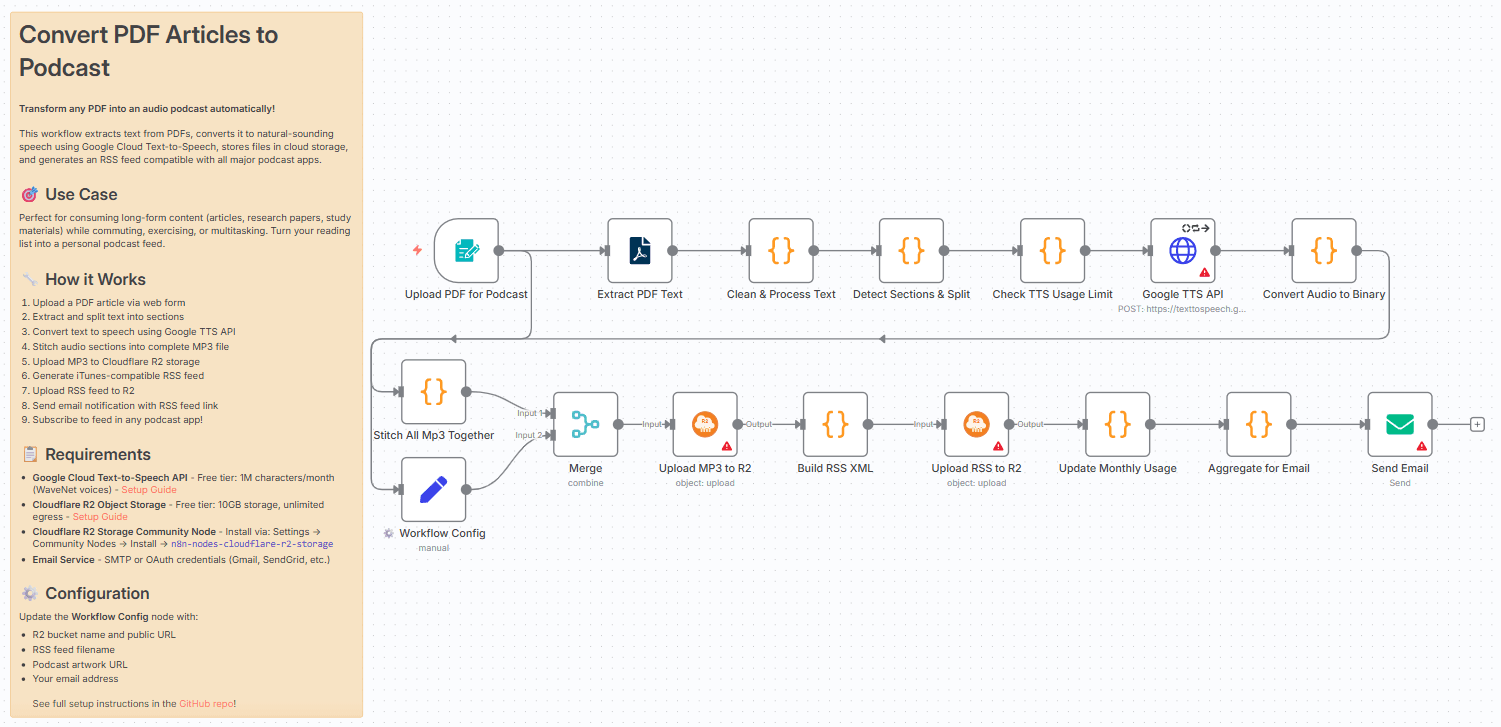Convert PDF Articles to Podcast
Workflow Name: Convert PDF Articles to Podcast
Author: Devjothi Dutta
Category: Productivity, Content Creation, Automation
Complexity: Medium
Setup Time: 45-60 minutes

📖 Description
Transform any PDF article, research paper, or document into a high-quality audio podcast automatically. This workflow extracts text from PDFs, converts it to natural-sounding speech using Google Cloud Text-to-Speech, stores the audio files in cloud storage, and generates an RSS feed compatible with all major podcast apps (Apple Podcasts, Spotify, Pocket Casts, etc.).
Perfect for consuming long-form content while commuting, exercising, or multitasking. Turn your reading list into a personal podcast feed.
👥 Who's it for
For Professionals:
- Convert industry reports and whitepapers to audio
- Listen to research papers during commutes
- Stay updated with long-form articles hands-free
For Students:
- Turn textbooks and study materials into audio
- Create audio versions of lecture notes
- Study while exercising or commuting
For Content Creators:
- Repurpose written content into audio format
- Create podcast episodes from blog posts
- Reach audio-focused audiences
For Busy Readers:
- Convert saved articles to a personal podcast
- Listen to newsletters and essays on the go
- Build a private audio library
✨ Key Features
- 📄 PDF Text Extraction - Automatically extracts text from any PDF file
- 🎙️ Natural Voice Synthesis - High-quality WaveNet voices from Google Cloud TTS
- ☁️ Cloud Storage - Files hosted on Cloudflare R2 (S3-compatible) with public URLs
- 📻 RSS Feed Generation - Full iTunes-compatible podcast feed with metadata
- 📧 Email Notifications - Instant alerts when new episodes are ready
- 🎨 Custom Branding - Configurable podcast name, artwork, and descriptions
- ⚙️ Modular Configuration - Easy-to-update centralized config node
- 🔄 Automated Workflow - Set it and forget it - fully automated pipeline
🛠️ Requirements
Required Services:
- n8n (self-hosted or cloud) - Workflow automation platform
- Google Cloud Platform - Text-to-Speech API access
- Free tier: 1 million characters/month (WaveNet voices)
- Paid: $16 per 1 million characters
- Cloudflare R2 - Object storage for audio files and RSS feed
- Free tier: 10GB storage, unlimited egress
- Email Service - SMTP or email service for notifications
Required Community Nodes:
- Cloudflare R2 Storage (
n8n-nodes-cloudflare-r2-storage)- Install via: Settings → Community Nodes → Install
- Search for:
n8n-nodes-cloudflare-r2-storage - Important: Install this BEFORE importing the workflow
Optional:
- Custom domain for podcast feed URLs
- Podcast artwork (3000x3000px recommended)
📦 What's Included
This workflow package includes:
- Complete n8n workflow JSON (ready to import)
- Comprehensive setup guide
- Architecture documentation
- Configuration templates
- Credentials setup instructions
- Testing and validation checklist
- RSS feed customization guide
- Troubleshooting documentation
🚀 Quick Start
- Install community node (required):
- Go to Settings → Community Nodes → Install
- Search for:
n8n-nodes-cloudflare-r2-storage - Click Install and wait for completion
- Import workflow into your n8n instance
- Configure credentials:
- Google Cloud TTS API key
- Cloudflare R2 credentials (Access Key ID + Secret)
- SMTP email credentials
- Update Workflow Config node with your settings:
- R2 bucket name and public URL
- Podcast name and description
- Artwork URL
- Email recipient
- Test with a sample PDF to verify setup
- Add RSS feed URL to your podcast app
📊 Workflow Stats
- Nodes: 10
- Complexity: Medium
- Execution Time: ~2-5 minutes per PDF (depends on length)
- Monthly Cost: $0-20 (depending on usage and free tiers)
- Maintenance: Minimal (set and forget)
🎨 Customization Options
- Change TTS voice (20+ English voices available)
- Adjust speech speed and pitch
- Customize RSS feed metadata
- Add custom intro/outro audio
- Configure file retention policies
- Set up webhook triggers for remote submission
🔧 How it Works
- User uploads PDF to n8n
- Text is extracted from PDF
- Text is sent to Google TTS API
- Audio file (.mp3) is generated
- Files uploaded to R2 storage:
- Original PDF
- Generated MP3 audio
- RSS feed is generated/updated with:
- Episode title (from PDF filename)
- Audio URL
- Duration and file size
- Publication date
- Rich HTML description
- RSS feed uploaded to R2
- Email notification sent with episode details
💡 Pro Tips
- Voice Selection: Test different WaveNet voices to find your preferred style
- Batch Processing: Process multiple PDFs by running workflow multiple times
- Quality vs Cost: WaveNet voices sound better but cost more than Standard voices
- Storage Management: Set up R2 lifecycle rules to auto-delete old episodes
- Custom Domains: Use Cloudflare for custom podcast feed URLs
🔗 Related Workflows
- PDF to Email Summary
- Document Translation to Audio
- Blog RSS to Podcast
- Multi-language Audio Generation
📧 Support & Feedback
For questions, issues, or feature requests:
- GitHub: PDF-to-Podcast---N8N Repository
- n8n Community Forum: Tag @devdutta
- Email: [email protected]
📄 License
MIT License - Free to use, modify, and distribute
⭐ If you find this workflow useful, please share your feedback and star the workflow!